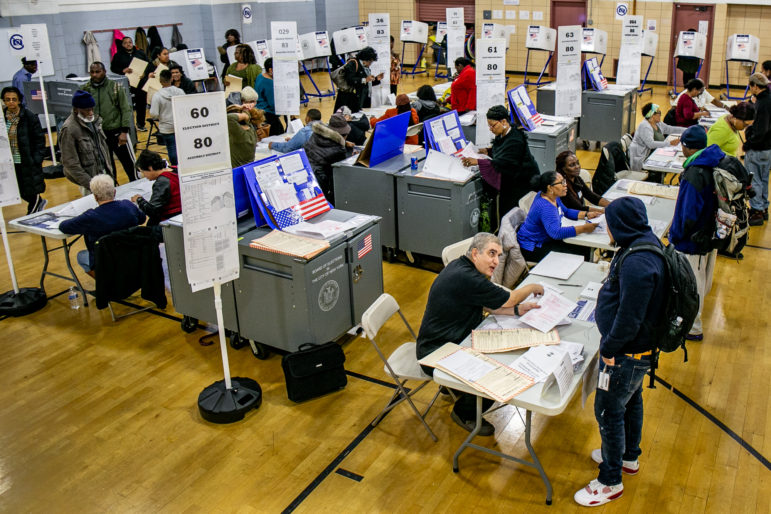
Adi Talwar
Polling Station located in PS41 on Olinville Avenue in the Bronx.We often hear the same refrain about why young people in New York choose not to vote in elections: They just don’t care or can’t see the importance of voting. As youth voter advocates for NYC Votes over the past year, we’ve talked with thousands of high school students at civic training sessions, workshops, and hearings and we can tell you that explanation couldn’t be further from the truth.
Since the beginning of our work at NYC Votes, we’ve made it our goal to reach and connect with as many young people as possible, from all over the city, to engage them in honest conversations about local government and the barriers to voting. We provide them with the information and context they need so that they may go out to educate their peers and vote.
In our conversations with Gen Z New Yorkers about what keeps them from the polls, they cite three main factors: socioeconomic barriers, a sense of personal or community disenfranchisement, and a lack of civic education.
At a basic level are material needs. While students have Election Day off, what happens if a young voter has to babysit their siblings while their parents are at work? Or what if they are balancing school and work themselves? While it’s true that young people are less likely than their older counterparts to vote in local elections, it’s just not that simple. Socioeconomic status, family income, education, race, and naturalization status are all part of the equation that determines our voting habits.
 CityViews are readers’ opinions, not those of City Limits. Add your voice today!
CityViews are readers’ opinions, not those of City Limits. Add your voice today!
At a broader level they observe the historic disenfranchisement of low-income people, of people of color, and of people with disabilities. A lack of civics education worsens outside of school as young people watch candidates avoid doing outreach to their communities. Young people can see for themselves when the system isn’t working in their community’s favor, and this leads to a distrust of and dissatisfaction with the electoral process. So how can we expect young people in New York City to vote while depriving them of the tools and resources they need to participate in our elections? It’s not that they don’t care—far from it. It’s that we’re not even giving them a chance to care.
In the schools where they learn this history of disenfranchisement, civic education is not a mandatory subject. Instead, the civics curriculum is left to be implemented on a school-by-school basis. Schools without the staff, financial resources, or access to educational partnerships often do not provide civics education at all. Some students graduate from high school having never received an extensive classroom education on local government, civic participation, the roles of elected officials, or their voting rights and processes.
When we meet with young people in our workshops, they intuitively recognize how these factors play out in their lives, in their neighborhoods, and how they impact voter turnout for voters of all ages. This prompts a lot of questions about the future of our democracy as New York City becomes increasingly inequitable and inaccessible to marginalized groups.
One silver lining of the coronavirus crisis is that young people are tackling these issues. Student activists like Jessica Rosario who, since it became clear that our city would be facing public health challenges like never before, is pushing for the implementation of an online voter registration platform to ensure fair access to elections. Jessica is just one example among the many young people who are stepping up to either continue or take on a new role as a peer resource and role model. Now, this peer-to-peer approach is more important than ever.
That’s why we’re launching the We Power NYC Ambassador Program, to empower young people to become the leaders they need and deserve. Our hope is that young people, and the adults who are listening, will continue to partake in and make space for youth to take the mic, to mobilize their peers, and organize around the issues that matter most to them. That is how we’ll make sure every eligible New Yorker is getting to the polls.
Maya Vesneske and Olivia Brady are the Youth Voter Coordinators for NYC Votes, the nonpartisan voter engagement initiative of the NYC Campaign Finance Board. Through their new youth-centered campaign, We Power NYC, Maya and Olivia plan to organize New York City’s next generation of civic leaders through peer-to-peer engagement. Join NYC Votes on June 9th for a virtual Town Hall on Vote by Mail led by our We Power NYC Ambassadors.







